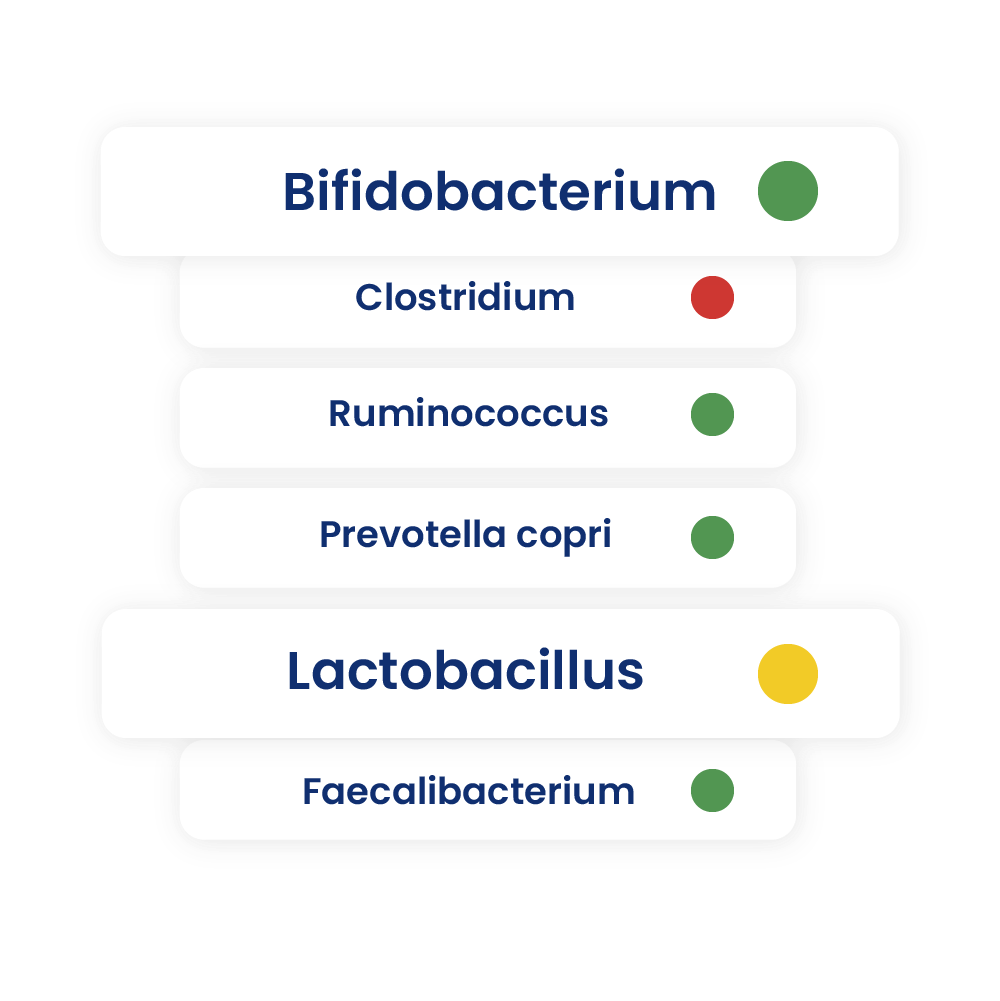What is gut bacteria?
Our gut is home to thousands of different types of species of microorganisms such as bacteria, fungi, and viruses. Some species are vital for our digestive system, nutrient absorption, immune system, mental health, and protecting us from developing chronic diseases, we call them beneficial gut bacteria. However other species can significantly impact our health if they grow in numbers, we call these harmful gut bacteria.
The beneficial and harmful species all reside in our digestive system, particularly in the large intestine, coexisting and fighting each other for nutrients and space, we call this our gut microbiome.
Beneficial bacteria help to regulate the numbers of harmful bacteria, preventing them from overwhelming the gut and causing health issues. When this balance between bacteria is disrupted, and harmful bacteria grow in numbers, it can lead to gut dysbiosis, a type of imbalance that can present various symptoms and have an impact on our overall health.
Gut dysbiosis is not only about the overgrowth of harmful bacteria but can also involve insufficient levels of beneficial microbes or an overall loss of microbial diversity.
Why is gut bacteria important?
Gut bacteria are crucial for maintaining our overall health and wellness, they help to educate and train our immune system to fight against harmful pathogens as well as significantly reduce our risk of developing chronic diseases such as cardiovascular disease, arthritis, diabetes, IBS, asthma, eczema and many more.
Through newer research, there’s a significant link between gut bacteria and the brain which we now know as the gut-brain axis, affecting our mood, anxiety, and stress levels. Our gut can also influence our sleeping patterns and overall quality of our sleep.
Our gut bacteria help our body carry out many important functions such as digesting food, especially fibres that our body is not able to break down. The beneficial gut bacteria also help our body to synthesise and absorb essential vitamins and minerals such as, Vitamin K and B and minerals such as Zinc, Calcium and Iron.
What is bad bacteria in the gut called?
Harmful bacteria in the gut are often referred to as pathogenic, bad bacteria or bad bugs. These can include strains like Salmonella, Escherichia coli (certain types), and Clostridium difficile, which can cause infections or contribute to disease when they become too numerous or invade parts of the body where they shouldn't be.
Types of good gut bacteria
Good gut bacteria include species and strains that contribute positively to health. Most good gut bacteria belong to the species bifidobacterium and Lactobacillus, both are probably the most well-know beneficial gut bacteria with many supplements and probiotics claiming to include them.
Lactobacillus - These bacteria are primarily found in the small intestine and play a key role in digesting lactose and producing lactic acid. Lactic acid helps to maintain an acidic environment in the gut, which can inhibit the growth of harmful bacteria.
Bifidobacterium - Found primarily in the colon, these bacteria help break down dietary fibre into short-chain fatty acids, which nourish the gut lining and help to control immune function. They are also known for enhancing the gut barrier, reducing the entry of harmful pathogens into the bloodstream.
Most good gut bacteria aids in digestions, supports immunity, helps us to absorb nutrients, fight off harmful bacteria and prevent a number of symptoms.
Did you know that Lactobacillus and Bifidobacterium play an important role in skin health? By supporting a balanced gut microbiome, they can help calm inflammation and promote clearer, healthier-looking skin.
Types of bad gut bacteria
Bad gut bacteria, while sometimes necessary in small amounts, can cause problems when they overpopulate or when the balance of gut microbiota is disturbed. Some include:
- Helicobacter pylori, also known as H.pylori: While it can live in the stomach without causing symptoms, it has been linked to increasing the risk of stomach cancer and can cause ulcers.
- Clostridium difficile: Often associated with antibiotic use, It releases toxins that cause symptoms ranging from diarrhoea to life-threatening inflammation of the colon.
- Pathogenic Escherichia coli: While some strains are harmless, others such as E. coli O157:H7 can cause food poisoning, urinary tract infections, and other illnesses. In vulnerable people, such as children and the elderly, the infection can cause kidney failure and even be life threatening.
These bacteria are considered harmful because they are known to cause symptoms and affect the overall balance of our gut bacteria and contribute to poor gut health.
A gut parasite test can identify can be used to identify a number of pathogenic bacteria as well as viruses and parasites.
How to starve bad gut bacteria
Starving bad gut bacteria involves preventing or limiting them of the food they feed off, this is mostly done by implementing diet and lifestyle changes. The most effective ways to starve bad gut bacteria includes:
- Limiting sugar intake
- Limiting processed foods
- Ensure you meet the recommended daily fibre intake (to support your good gut bacteria)
- Eat whole foods
- Where necessary, reduce your use of antibiotics (they can also destroy good bacteria along with the bad ones)
- Increase your good gut bacteria
How to increase good gut bacteria
Diet and lifestyle changes should also be your first point of call when trying to increase your good gut bacteria, we recommend:
- Maintain a balanced diet consisting of vegetables, fruits, whole grains and fibre rich foods.
- Regular physical activity, it can help to reduce stress and directly impacts the composition of our gut microbiome.
- Adequate sleep, ensuring 7-8 hours daily.
- Adding probiotic rich foods into your diet (yoghurt, kefir, sauerkraut, kimchi)
- Add prebiotic foods into your diet (garlic, asparagus, onions, leeks, bananas)
Understanding which foods are good for gut health can help you to make better dietary choices in the long term and significantly improve your gut health.
What’s the difference between Probiotics and Prebiotics? - Probiotics contain live microorganisms, when consumed they increase the number of good bacteria within the gut. Prebiotics are high-fibre foods that directly feed our good gut bacteria.
Can a gut microbiome test tell me which bacteria I have?
Yes, a gut microbiome test measures thousands of different bacteria strains to assess the overall balance of bacteria within your gut. It will pick up on imbalances as well as which harmful gut bacteria strains are present.
Depending on how comprehensive the test is, you may be given a personalised health and nutrition plan to reduce harmful gut bacteria and increase good bacteria.
In summary
If you are eating a diet consisting of many different diverse healthy foods, this gives your microbiome the tools to improve its diversity of healthy gut bacteria. It’s no surprise that what we eat directly influences our gut microbiome, if we feed the good gut bacteria with the foods they require, naturally our bad gut bacteria will reduce in numbers having a positive impact on our overall health.





